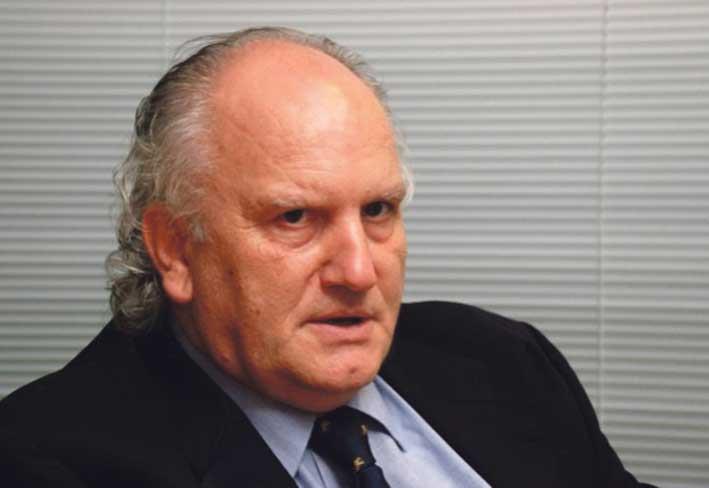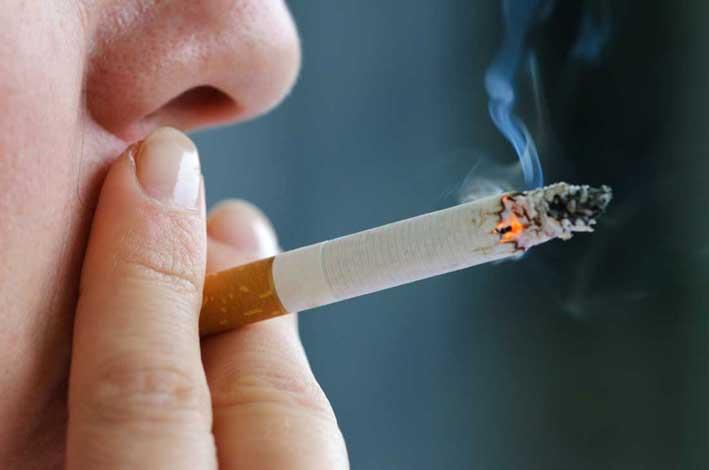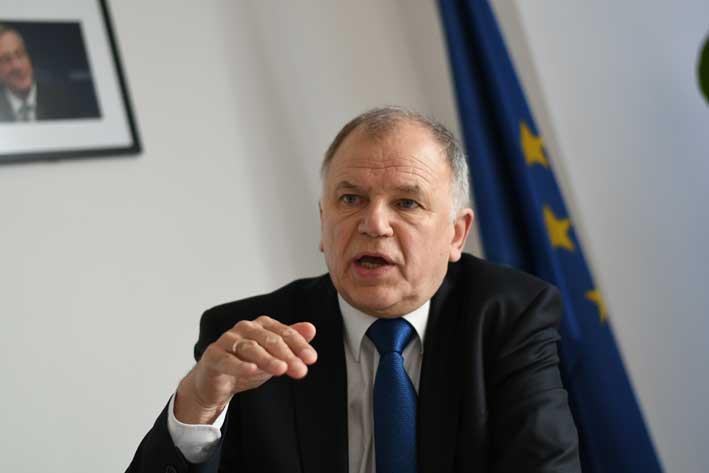EU Commissioner for Health Vytenis Andriukaitis was unable to comment on recent allegations that Deputy Central Bank Governor Alfred Mifsud was paid by tobacco company Philip Morris to get close to former Health Commissioner John Dalli.
When asked about the issue this week, the Commissioner said he is not responsible for legal issues. He said: “The Commission introduced strict transparency rules and it strictly follows the World Health Organisation’s global Tobacco Convention requirement to avoid contact with the tobacco industry. We are strictly in line and we will do our best. I am not capable of commenting on this question.”
The European Union acceded to the WHO Framework Convention on Tobacco Control back in 2005, which states: “in setting and implementing their public health policies with respect to tobacco control, Parties shall act to protect these policies from commercial and other vested interests of the tobacco industry in accordance with national law.”
In order to protect this provision, parties adopted non-binding guidelines, including one principle which reads: “Parties, when dealing with the tobacco industry or those working to further its interests, should be accountable and transparent. Parties should ensure that any interaction with the tobacco industry on matters related to tobacco control or public health is accountable and transparent.”
The Commission has recently been under fire from the European Ombudsman, with the Commission stating that by answering access to document requests, and by responding to questions from Members of the European Parliament, it had met its obligation, and the Ombudsman arguing that the Commission must take active measures to limit interactions with major tobacco corporations known as ‘Big Tobacco’, and be transparent about its dealings with it. “Otherwise, no details of meetings with lobbyists would become public unless a question was asked.”

Journalist Daphne Caruana Galizia, on her blog, recently claimed that Philip Morris International paid Alfred Mifsud €2,750 a month as a middleman or go-between with the then European Health Commissioner John Dalli. Mrs Caruana Galizia wrote that Mr Mifsud’s sole brief was to relay information and messages between John Dalli and Philip Morris International, because Mr Dalli could not have private and unlogged meetings with the tobacco giant.
According to Mrs Caruana Galizia’s article, Alfred Mifsud told her that Mr Dalli visited his office twice a year during 2011 and 2012.
Alfred Mifsud, however, has in media reports denied that the meetings between him and Mr Dalli were connected to tobacco and insisted that his meetings with the former Health Commissioner dealt with the Greek financial crisis. He said he had asked to meet Mr Dalli to express his reservations on the financial package at the time, and claimed that Mr Dalli needed technical information to participate in such debates at Commission level.
He also denied having ever discussed tobacco with Mr Dalli, and, according to news reports, said he was paid by Philip Morris “to follow up events related to class action legislation, to monitor fiscal effects of increased taxes on tobacco products and to report anything appearing in the media on tobacco”.

It is time to act more energetically on public health issues
Commissioner Andriukaitis also spoke about the need for collaboration between Health Ministries, and other Ministries, across the EU on topics such as obesity and alcohol consumption.
“It’s time to act more energetically on public health issues, using instruments not in the hands of health ministers” he said, while highlighting the number of premature deaths due to tobacco, obesity and alcohol consumption.
“We have taxation instruments, marketing instruments, instruments relating to the accessibility of alcohol and tobacco, instruments to regulate advertising, to strengthen awareness, that deal with educational programmes, etc., yet these do not fall under health ministries,” he said, highlighting the need for collaboration.
He mentioned that last year there were 700,000 deaths due to tobacco. He also said that the EU is a world leader in alcohol consumption.
“Is premature death today a problem in the EU? If yes, we must use the instruments available, and use the Lisbon principles, have health considered in all policy sectors and ask Council formations to act along the same lines.”
Asked about the wealth imbalance between citizens of different EU countries when it came to citizens from one country seeking specialised care in another, the Commissioner said that healthcare systems are in the hands of member states. EU health systems are based on a number of different models, he said.
One way the EU is trying to help in this regard, however, is through reference networks. These networks attempt to link the efforts of specialists from across Europe to tackle complex or rare medical conditions that require highly specialised healthcare and a concentration of knowledge and resources.

He said that a call on the reference networks was carried out in March and results will begin to be seen in 2017, saying that the Commission will ask governments to sort out reimbursement issues and the cost of treatment between themselves.
“At the moment, we are assessing the situation on the ground. The next step will be to see a debate between countries to agree on reimbursement and compensation issues, as they must allocate funds in their national budgets for this. All patients have a right to move and all countries must have a national contact point and present allocated financial resources to cover the cost of treatment in these reference centres.”
Another option involves how to encourage more country cooperation after a clearer picture becomes available in 2017, pooling resources, strengthening reference centres and sharing responsibility.
He said: “We need to guarantee the possibility for clinicians to go from one centre to another to work and study, to be a part of clinical trials, etc., and we must cooperate within the EU reference network. Asking governments to debate all this in more detail is our obligation. Details must also be studied and we as the Commission are ready to facilitate this.
Asked about Vitals Global Healthcare and his view about the agreement in Malta, he said: “It is not up to the Commission to debate problems relating to national issues or how member states organise healthcare systems and how they decided to finance the sector and invite private investors to debate issues through private-public partnerships. All governments have a new instrument, the European Fund for Strategic Investment, which allows the possibility of presenting new PPP projects and cover some risks of projects if such a project has specific uncertainties.”
He also spoke about primary healthcare being a problem in a number of EU countries. “I know primary healthcare in Malta is also a problem, and different opportunities are on the table. It’s up to the Maltese government to attract more private investment in healthcare. Of course, we welcome all initiatives if they support the healthcare system becoming more sustainable, accessible and resilient. These three elements must remain. It’s up to Malta how it should deal with different financial compositions.”

Asked about the Maltese healthcare system, he spoke of obesity and child diabetes as some of the main concerns. He spoke of the use of preventive, promotive and protective instruments to fight against such pandemics in the EU.
“Child diabetes and obesity is growing, and it’s not because there aren’t enough hospitals, or because there isn’t enough access to treatment. It has to do with many instruments related to the regulation of sugar and the quality of meals. Healthy food is not safety food. Safety food is a very high EU standard, but the next step must include safety food and healthy food, where we regulate sugar, salt and fatty acids and deal with problems relating to labelling, marketing, etc.”
Mr Andriukaitis spoke of local primary healthcare problems and the fact that Malta is trying to improve community-based medicine, adding that this is the right way to go. “Such large numbers of both outpatients and in-patients are a big problem in all 28 member states. All members face problems, and we must work everywhere to strengthen early diagnosis, patient centre approach, etc.”
Turning to anti-vaccine movements (groups who believe that children should not be vaccinated), he said that because we have more effective medication, and people do not understand that they live in an environment of collective immunity, these issues crop up. “My generation was vaccinated 100 per cent against main diseases, and our individual immunity helped save the next generation as our immune systems cannot pass these on, thus the 10 per cent who, for example, would not be vaccinated will not be affected due to the collective immunity in society.”
What happens then is that the younger generations begin to believe that it doesn’t matter and so they don’t vaccinate their children as they believe they are safe.
During the Ebola pandemic, he said, the main message was for the creation of effective vaccines. On the one hand, you see the need for vaccines to combat new threats, and yet on the other, some people don’t want vaccines in very developed countries. We must rely on science. Today HIV, Zikka and Ebola need a new type of vaccination.”